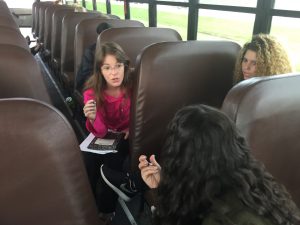For the past decade, students in Professor James Pancrazio’s section of Spanish 244, Latin American Culture, have participated in the all-day field experience in Chicago’s Little Village, one of the largest Mexican-American enclaves in Illinois.
This component was developed as part of the Teaching Quality Enhancement Grant that was provided by the Chicago Teacher Education Pipeline (CTEP), a multimillion dollar grant from the U.S. Department of Education to train future teachers in areas of high need. Robert Lee, CTEP’s executive director of statewide urban programs and partnerships, reached out to faculty to develop course components that provided students with opportunities to work with area schools in these neighborhoods.
Initially, the field experience consisted of observation in bilingual schools. However, because of a request for assistance from the principal of Maria Saucedo School, the field experience added simultaneous interpretation for parent-teacher conferences on report-card pickup day. Since then, students from Illinois State have been working with cooperating teachers to provide interpreting services in Spanish and English.
Originally, the field experience focused only on two schools: Spry and Saucedo. However, over the years, Illinois State students in Spanish have assisted in other schools in the area: Madero, McCormick, Little Village Academy, Zapata, Gary and Kanoon.
Between 30 and 40 students participate in this all-day experience each year Pancrazio offers the course. After a brief orientation on site, students are dropped off at the participating schools and are paired with cooperating teachers. From 11 a.m. to 6 p.m., students meet with parents and students to discuss the academic performance in that quarter.
There are many benefits to this kind of activity: students use their Spanish, engage with native speakers, and communicate in a meaningful context. They also provide feedback to the parents about their children’s performance in school. Pre-service students in education also have the advantage to see firsthand how veteran teachers manage the parent teacher conference is in ways that are most productive and efficient.
This field experience is taught in conjunction with the unit on the growing Latino population in the United States. It also brings students to an area of Illinois that they may not be familiar with, helping them discover the cultural richness of the state’s diversity. It puts them into direct contact with the immigrant experience of becoming American and the search for the American dream.



